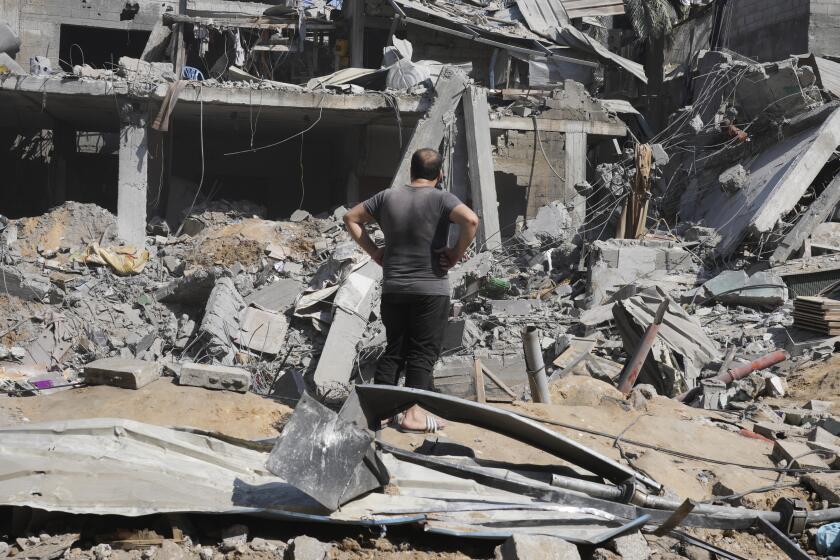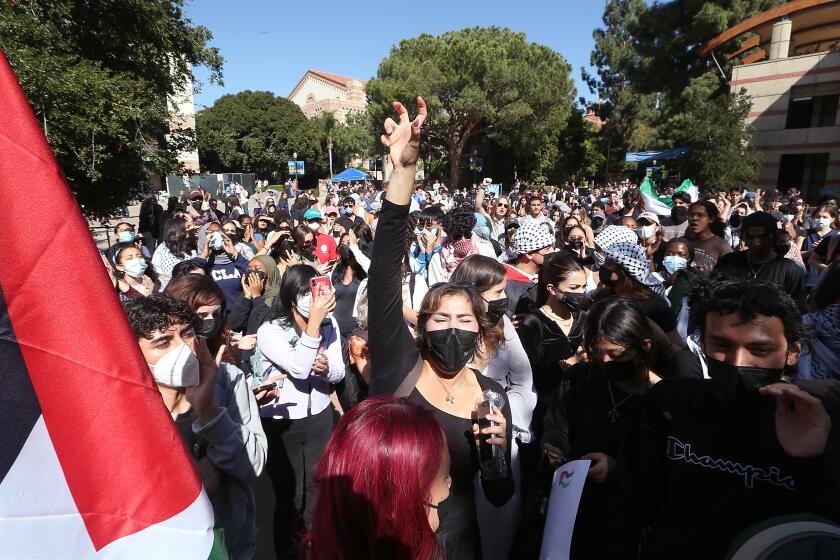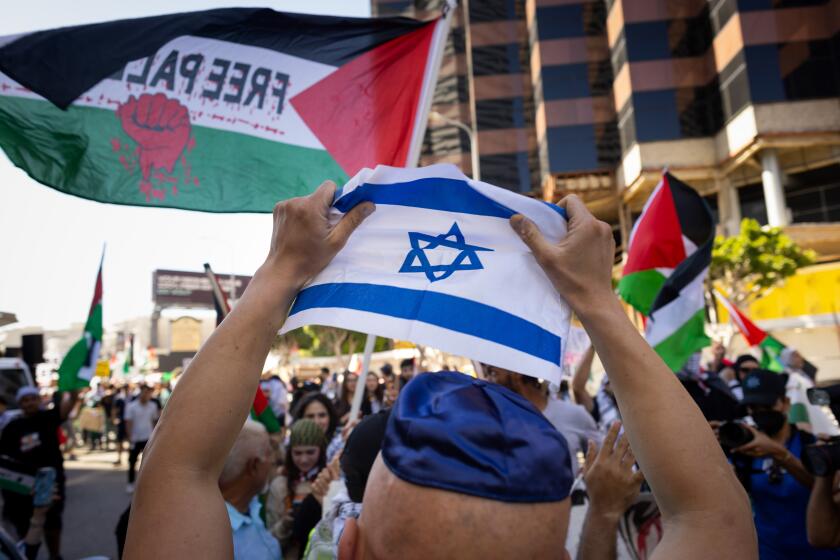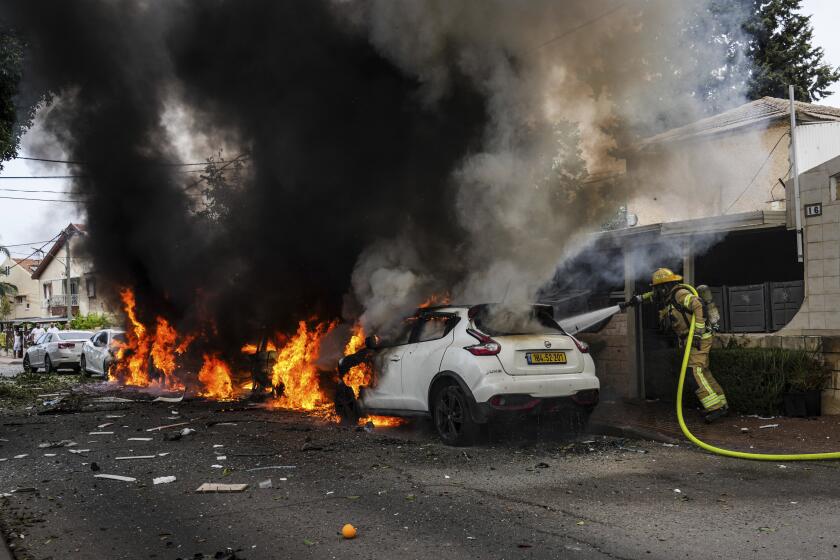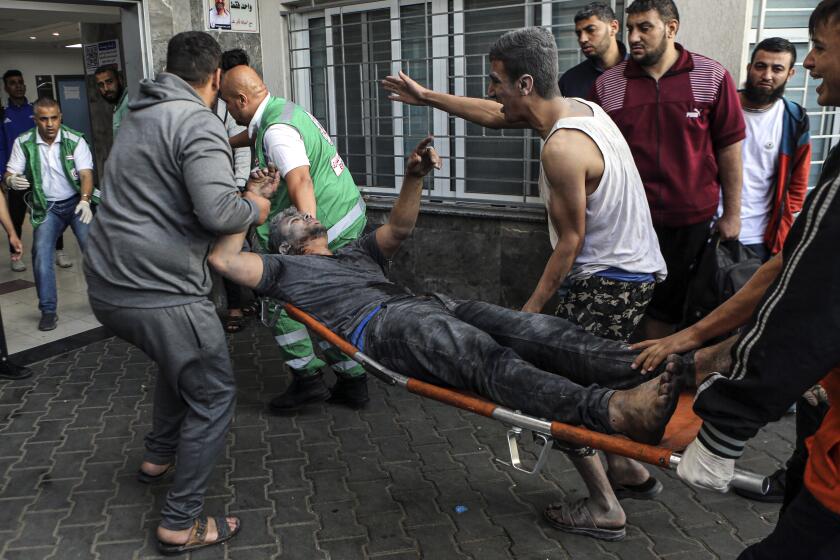In war and peace, the fates of Israel and the Palestinians are inextricably bound together
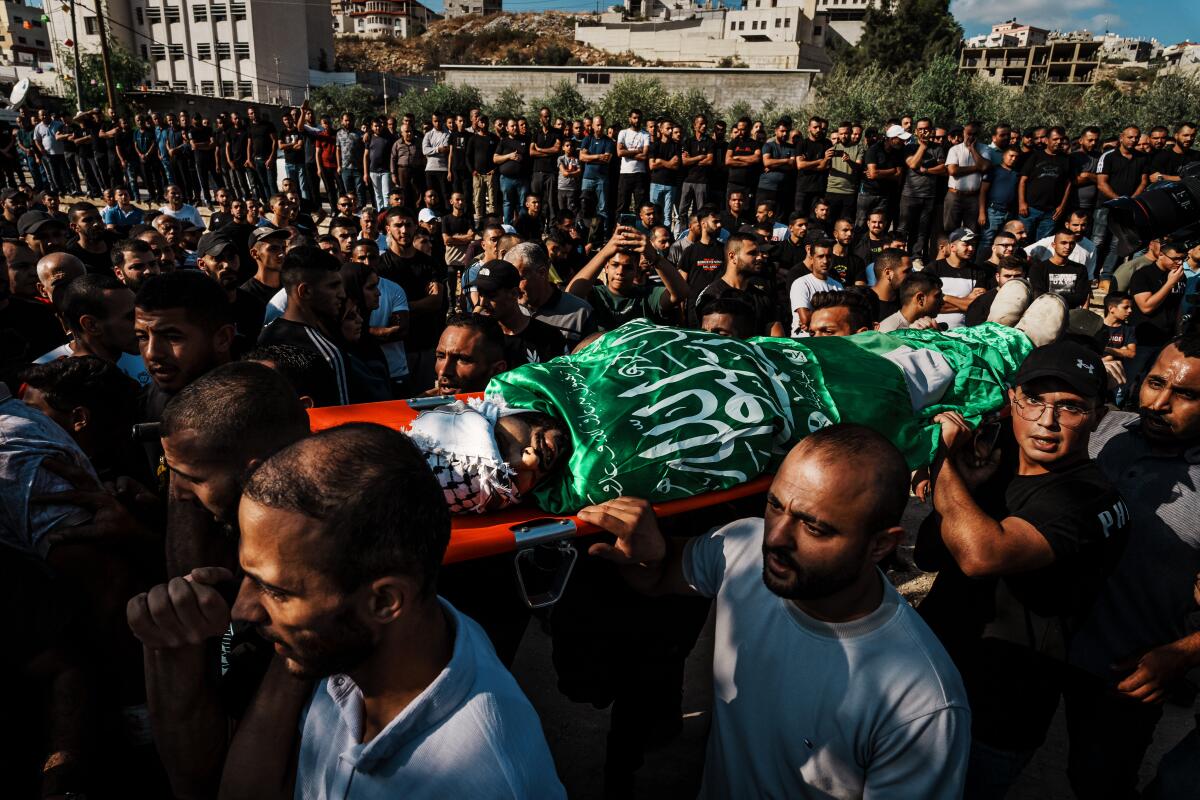
- Share via
War and conflict are almost invariably zero-sum games. What makes war so unforgiving, even oddly unifying, is that there is a shared experience of irreparable pain, loss, trauma and destruction. Even the victor emerges a loser. The cruelty of war is that those shouldering the greatest loss are often the ones left abandoned, wondering, futilely, whether it was all worth it.
Conflict must be understood through its catalyzing force: the collapse of empathy. We silence the human impulse to switch places by rationalizing animosities that enable us to strip others of their equal worth and right to life.
The Israeli-Palestinian conflict, and the conflict encircling the conflict, has been beset by the same moral bankruptcies and zero-sum mentalities.
My beloved Gaza of crowded markets and vibrant cafes is gone, demolished and a place of grief
My sisters are taking refuge north of Gaza City in a hospital and a school operated by the United Nations, but no place in Gaza is safe.
A bedrock fallacy underpinning the Israeli-Palestinian conflict since its inception is that it’s inherently ideologically incompatible to be both pro-Israel and pro-Palestinian. That reductive mind-set has dominated the discourse to the detriment of healthy debate and conflict resolution.
One can easily digress into a debate about the many rounds of war and failed peace plans. That has been done ad nauseam. But the origins of our allegiances can be traced to 75 years of politicians, pundits and profiteers pushing the false dichotomy of either being pro-Israel or pro-Palestinian. Dividing lines naturally breed division. Answering favorably for one party suggests that one is antagonistic — perhaps even hostile — toward the other.
A consequence of division is its self-fulfilling tendencies: We convince ourselves that our cause is just, its excesses cannot be questioned, and even the mere thought of expressing empathy with the other is tantamount to betrayal. And so those of us with no stake in the war nevertheless take up arms for our side as we pontificate from the privileged confines of peace.
No college student should be made to feel unsafe on campus. Most genuinely care about all civilians affected by the terror attack on Israel and the humanitarian crisis in Gaza.
We are watching this dynamic on full display in the current war.
When Hamas terrorists broadcast their slaughter of more than 1,400 Israelis, kidnapped hundreds, raped women and beheaded human beings, one would be forgiven for assuming, perhaps naively, that allegiances would be suspended in favor of unconditional solidarity against these crimes.
Instead, we witnessed those who wrap themselves in the cloak of justice glorify the same strain of terrorism they had no qualms condemning in other parts of the world as they heartlessly rip apart posters of missing children and lecture the victims for their own slaughter. Many immediately yelled, “Free Palestine,” before ever even calling to free the hostages.
We are a Palestinian and an Israeli in Los Angeles. We find comfort and hope in mourning together
Our close connection does not mean we agree on all aspects of the catastrophic situation in the Middle East. But the path to peace starts by not selectively grieving only those with whom we share religion or national origin.
Of course, many are motivated by a hatred of Jews, and so there’s no need to grant them the benefit of the doubt and attribute their antisemitism to something more benign. But even those who don’t ostensibly hate Jews struggle to pause and meaningfully acknowledge their pain before pivoting to the plight of Palestinians for fear of being called a sellout.
Meanwhile, on the south side of that cursed border lie 2 million walking dead whom we refuse to look in the eyes; half of them children. These Palestinians are yearning to be free — free from Hamas’ vise grip and free from the banality and brutality of blockade. Many of them knew they were operating on borrowed time in the wake of Oct. 7. Homes that housed generations, reduced to rubble. Sentimental family belongings, the threads connecting generations, severed. Dead children, too young to even curse the world they were briefly brought into, dug out of the dirt by a stranger, because that child’s parents have also perished.
The staircase in my building is considered safer than our apartment during a rocket attack. But its windows face Gaza, and if a rocket hits the building, we’ll die. That’s my life right now.
For many, the greatest emotion they can muster is pity — consigning Palestinians to unfortunate collateral damage and victims of Hamas’ cruel misappropriation of civilian infrastructure. But they deserve more.
Acknowledging their plight without quibbling over its cause doesn’t discount Israeli suffering or trauma. But for many, doing so would be a sharp departure from a reflexive insistence on Israeli exceptionalism, which fails to consider that holding Israel to this impossible standard of perfection naturally sets it up for failure.
An insufficient amount of people understand that it is not just possible to be both pro-Israel and pro-Palestinian, but that it is impossible not to be, for their destinies are inextricably bound together.
What happened when the United States invaded Afghanistan to demolish the Taliban foreshadows what could happen in Gaza.
Israelis won’t know peace so long as Palestinians don’t, and vice versa. Ignoring this inconvenient truth will only raise more embittered and radicalized children of war.
Adhering to the pro-Israel/pro-Palestinian binary frustrates our ability to speak with intellectual honesty and moral clarity. Palestinian statehood will remain a pipe dream so long as liberation is sought through terrorism, or the constant threat of it.
At the same time, we must acknowledge that the far-reaching tentacles of occupation are rapidly eroding Israel’s moral fabric, perpetuating the cycle of violence, and deluding us into believing that it’s possible for the state of Israel to remain Jewish and democratic without the establishment of the state of Palestine. No amount of military might can exhaust the desperation that statelessness arouses.
The tragic thread connecting Israelis and Palestinians is the shared experience of irreparable pain. For too many, it is also the refusal to hold space for the other’s pain out of an insecurity that it invalidates ours. A better future begins by disabusing ourselves of that notion. Because a precondition for mutual peace is accepting the other’s humanity.
Daniel Bral is a civil rights attorney and a writer on Israel-Palestine issues. @danielbral
More to Read
A cure for the common opinion
Get thought-provoking perspectives with our weekly newsletter.
You may occasionally receive promotional content from the Los Angeles Times.
